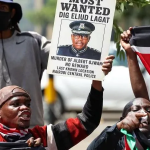Nigeria’s President Bola Tinubu has ordered security agencies to bring an end to a wave of killings in the central Benue state.
It is believed that more than 200 people have died in a series of attacks across various communities in the last few days alone.
Tinubu described the killings as “inhuman and anti-progress”. He was speaking after hundreds stormed the streets of the state capital Makurdi to protest against the killings.
Authorities say thousands have been forced to flee their homes.
How serious is the violence in Benue?
This is not a new problem but it has escalated recently.
Analyst Kabir Adamu, head of Beacon Security and Intelligence Limited, told the BBC that according to their database, 1,043 people were killed in Benue between May 2023 and May 2025.
The state has been at the centre of a violent conflict between herders and farmers that has led to the killing of thousands of civilians and many members of the security forces in Nigeria’s so-called Middle Belt going back many years.
Herders, mostly from the Fulani ethnic group, move around to find food for their cattle, bringing them into conflict with the owners of farms, who say the cattle trample their crops and pollute water sources.
Some of them are armed with powerful guns, saying they need to protect themselves from cattle thieves.
While the farmers often blame the Fulanis for the violence, one of the community’s leaders, Baba Othman Ngelzarma, told the BBC that his people were not behind the killings in Benue.
“Our people are not behind the Benue killings, we know there are some unresolved issues in Benue which have been there for some time.
“But we have never allowed any of our people to attack or kill others,” he says.
The authorities have not blamed any group but it is safe to assume that there are lots of victims on both sides, as any attack usually leads to revenge and then a cycle of violence.
“Environmental degradation, notably climate change-induced desertification and irregular rainfall patterns in Nigeria’s northern regions, plays a critical role,” says Mr Adamu.
“These pressures compel herders to migrate southward… including Benue State, where resources are already strained.
“Rapid population growth in these areas further intensifies the competition for limited land and water, creating a self-reinforcing cycle of environmental stress, migration, and conflict escalation,” he noted.
Religion is an additional factor as the Fulanis are mostly Muslim while the farming communities in Benue are Christians.
Many also blame the authorities for not providing more security or coming up with policies that address the economic needs of both communities.
What is the government doing about the conflict?
Both the state and national governments have tried various policies over the years but none have proved successful yet.
Mr Adamu says a federal joint task force was launched in 2018 and then another one last month, the Forest Guards.
“This national system aims to recruit armed operatives to secure forest reserves from terrorists and criminals.”
Public affairs analyst Sam Philip, who lives in Makurdi, says the conflict has not been getting the attention it deserves for years, with the government focusing on other security crises like the Boko Haram insurgency in the north-east, the demand for secession in parts of the south-east and a wave of kidnapping for ransom in the north-west.
“I feel this issue has been ignored for long in terms of real attention from the government and that is why things continue to escalate,” he noted.
How can it be resolved?
Mr Adamu says any solution needs to have both security and economic elements.
The government needs to “deploy more tactical and intelligence-based special forces to Benue State, ensuring their presence is sustained and adaptable to shifting threats”, he says.
There also needs to be more grazing land for the herders so they don’t come into conflict with farmers.
“The aim should be to ensure it is equitable and provides viable, sustainable alternatives for pastoralists,” Mr Adamu said.
Former President Muhammadu Buhari did come up with such a plan, however this was rejected by states in the south, who saw it as a way of giving the Fulanis a share of their land.














